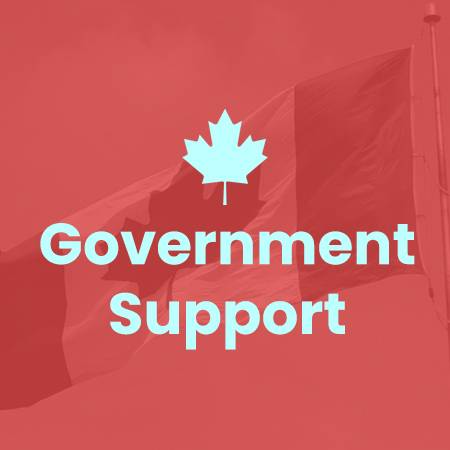Copyright © 2019 Auto Parts Centres (APC) a division of Canusa Automotive Warehousing Inc., All Rights Reserved. Contents may not be reproduced or duplicated without the explicit consent of APC or Canusa Automotive.

Government Support for Your Business
5 years ago | general
Government Support for Your Business
Stay Connected:
Sign up to get email updates on COVID-19 from the government of Canada
Canada Revenue Agency (CRA) services, due dates and programs affected by the pandemic:
Individuals - Due Dates
1. Income tax filing and payment dates:
Individuals - Due Dates
Filing date for 2019 tax year - June 1st, 2020 extended
Payment date for 2019 tax year - September 1st, 2020 extended includes the June 15th, 2020 instalment payment for those who have to pay by instalments.
Self-employment and their spouse or common law partner - Due Dates
Filing date for 2019 tax year - June 15th, 2020 unchanged
Payment date for 2019 tax year - September 1st, 2020 extended includes the June 15th, 2020 instalment payment for those who have to pay by instalments.
Corporations - Due Dates
Filing date for 2019 tax year - June 1st, 2020 extended Applies to corporations that would otherwise have a filing due date after March 18th and before June 1st, 2020.
Payment date for 2019 tax year - September 1st, 2020 extended applies to balances and instalments under part 1 of the Income Tax Act due on or after March 18th and before September 1st, 2020
2. Support for employers:
10% Temporary wage subsidy for employers
The Government announced a 10% temporary wage subsidy for employers for a period of 3 months.
Eligible employers (individuals (excluding trusts), certain partnerships, non-profit organizations, registered charities, or Canadian-controlled private corporations) who pay salary, wages, or taxable benefits to employees, between March 18, 2020 and June 19, 2020, can reduce payroll remittances of federal, provincial, or territorial income tax by the amount of the subsidy. This measure is only applicable to remittances made to the CRA.
Learn more: FAQs for temporary wage subsidy for employers
Deferral of GST/HST Remittances
The CRA will allow all businesses to defer, until the end of June 2020, any GST/HST payments or remittances that become owing on or after March 27, 2020, and before June 2020. This means that no interest will apply if your payments or remittances are made by the end of June 2020.
Learn more: FAQs for deferral of GST/HST Tax Remittances
Canada Emergency Wage Subsidy (CEWS)
As a Canadian employer whose business has been affected by COVID-19, you may be eligible for a subsidy of 75% of employee wages for up to 12 weeks, retroactive from March 15, 2020, to June 6, 2020.
This wage subsidy will enable you to re-hire workers previously laid off as a result of COVID-19, help prevent further job losses, and better position you to resume normal operations following the crisis.
Starting April 27, 2020, eligible employers can apply in CRA My Business Account or through a separate online application form.
Get ready to apply: Canada Emergency Wage Subsidy (CEWS)
3. Loans and Lending Support for Businesses:
What is the Canada Emergency Business Account (CEBA)?
To ensure that small businesses have access to the capital they need to see them through the current challenges, the Government of Canada has launched the new Canada Emergency Business Account, which has been implemented by eligible financial institutions in cooperation with Export Development Canada (EDC).
This $25 billion program provides interest-free loans of up to $40,000 to small businesses and not-for-profits, to help cover their operating costs during a period where their revenues have been temporarily reduced, due to the economic impacts of the COVID-19 virus.
This will better position them to quickly return to providing services to their communities and creating employment.
Repaying the balance of the loan on or before December 31, 2022 will result in loan forgiveness of 25 percent (up to $10,000).
Small businesses and not-for-profits should contact their financial institution to apply for these loans.
What are the eligibility requirements for the CEBA?
- The Borrower is a Canadian operating business in operation as of March 1, 2020.
- The Borrower has a federal tax registration.
- The Borrower’s total employment income paid in the 2019 calendar year was between Cdn.$20,000 and Cdn.$1,500,000.
- The Borrower has an active business chequing/operating account with the Lender, which is its primary financial institution. This account was opened on or prior to March 1, 2020 and was not in arrears on existing borrowing facilities, if applicable, with the Lender by 90 days or more as at March 1, 2020.
- The Borrower has not previously used the Program and will not apply for support under the Program at any other financial institution.
- The Borrower acknowledges its intention to continue to operate its business or to resume operations.
- The Borrower agrees to participate in post-funding surveys conducted by the Government of Canada or any of its agents.
Are there any restrictions on how I can use CEBA funds?
The funds from this loan shall only be used by the Borrower to pay non-deferrable operating expenses of the Borrower including, without limitation, payroll, rent, utilities, insurance, property tax and regularly scheduled debt service, and may not be used to fund any payments or expenses such as prepayment/refinancing of existing indebtedness, payments of dividends, distributions and increases in management compensation.
Information sourced from CRA Website



